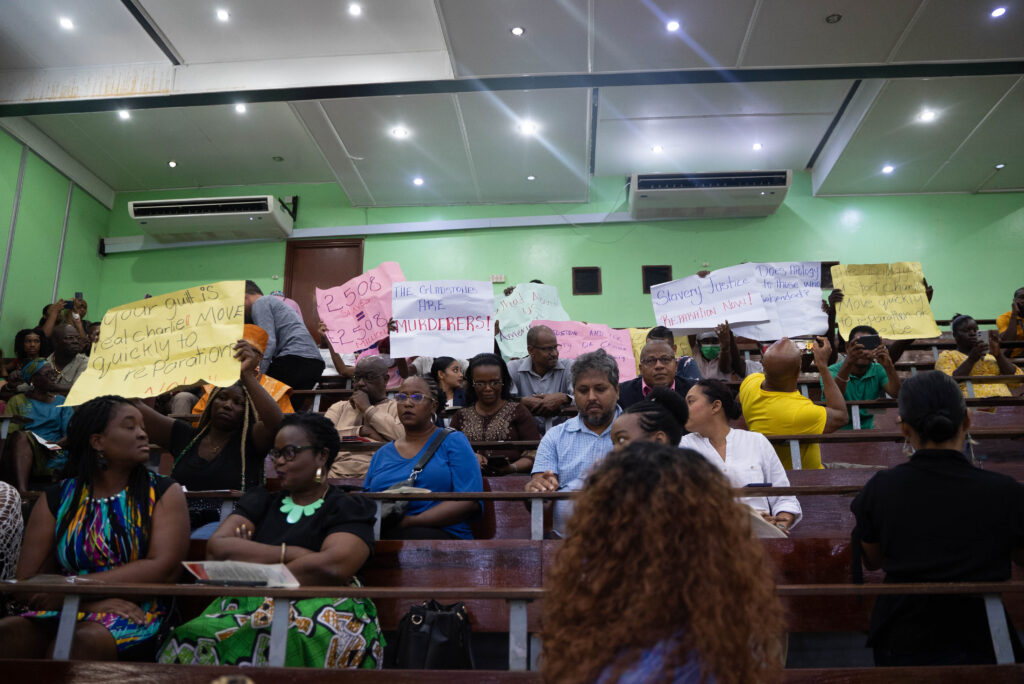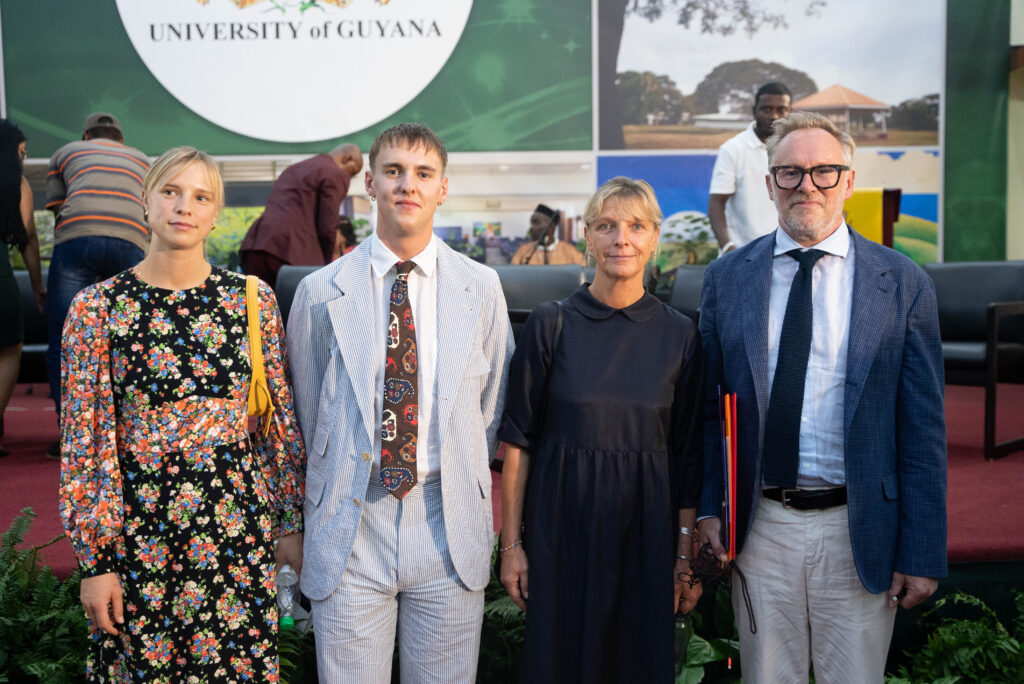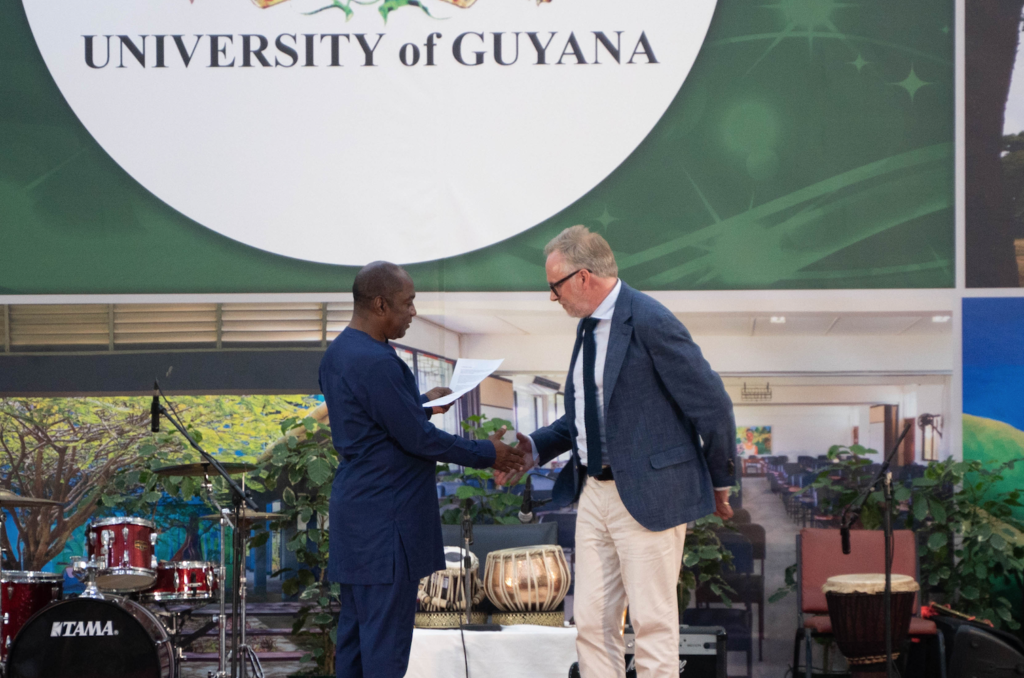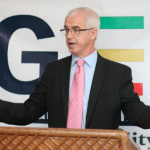
-by Svetlana Marshall-
The descendants of a former British slavery plantation owner have traveled to Guyana, offering an apology for slavery and indentureship.
Charles Gladstone , who is a descendant of slave plantation owner John Gladstone, apologized to the people of Guyana for the enslavement of their African ancestors, who for centuries, endured harsh and inhumane conditions while being held against their will.
John Gladstone owned plantations across Demerara for many years and was also the owner of many of the slaves who started the Demerara Slave Revolt in 1823.
At the University of Guyana today, the descendant Charles Gladstone admitted that slavery was a crime against humanity, and that its damaging impact continues to be felt across the world today.
“It is with deep shame and regret that we acknowledged our ancestor’s involvement in this crime and with heartfelt sincerity that we apologize to the descendants of the enslaved in Guyana. In so doing, we acknowledge slavery’s continuing impact on the daily lives of many,” Gladstone said.
Gladstone also acknowledged his ancestor’s own role in bringing indentured labourers to Guyana, and in doing so, he also apologized for the injustices committed.
In issuing his apology, he made a case for the British Government to support CARICOM’s 10 Point Plan for Reparatory Justice.
“We support CARICOM’s Ten Point Justice Plan and urge the British Government to enter into meaningful discussions with CARICOM so that both parties can move towards a better future together. We also urge other descendants of those who benefited from slavery to open conversations about their ancestors’ crimes and what they might be able to do to build a better future,” Gladstone said.

His apology, however, was rejected by a small group of Guyanese, who, during the course of his speech said they wanted more than just an apology.
One protester shouted that she was not accepting any apology.
“I am not accepting! Go back to the drawing board.”
The other protesters described the Gladstone family as murderers, and demanded reparatory justice. “They stole us, they sold us, they owe us, fair reparations now,” one placard read.
In an interview with reporters, Gladstone, while noting that the family had anticipated that there would have been push backs, said the protesters were well within their rights to express their feelings.
He said while his family cannot change history, it believes that the apology is a step towards a better future.
“I feel deeply ashamed by my ancestors. I think he was a vile man, but what I think I can do is focus on the future and try to make the world a better place. I know that I can’t change the past,” he told reporters.
Gladstone’s apology formed a major part of the launch of the University of Guyana’s Centre for Migration and Diaspora Studies. As part of their contributions to Guyana, the family would be funding a number of projects here.

Chairman of the Guyana Reparations Committee and Member of the CARICOM Reparations Council, Eric Phillips accepted the apology while chronicling the impact of slavery.
“Slavery was not only a “crime against humanity, African humanity, it was the first nuclear bomb the world has ever seen. Slavery tried to annihilate Africa, African culture, African family structures, African institutions, African commerce, African growth, African history, African pride, and African economic development,” he said.
He said notwithstanding the crimes committed against Africans, they forged ahead and today their contributions to the development of Guyana are immeasurable.
“First, in 1839, 83 freed African women and men bought Plantation Northbrook for 30,000 guilders ($10,000). This precipitated the Village Movement which was one of the greatest entrepreneurial acts by freed enslaved Africans anywhere in the world. It didn’t happen in any other Emancipated country.
The freed Africans saved money from the pittance they were given for overtime work after they had to work free for 45 hours before obtaining overtime. Within twelve years of the first purchase in 1839, freed Africans asserted their independence in a dramatic way. Of a total African population of 82,000 in British Guiana (Guyana), over 42,000 lived in the villages they bought and for which they had established their own local government,” he said.
Vice Chancellor of the University of Guyana, Dr. Paloma Mohamed said it was the first and most significant apology to be received by Guyana, and a critical step towards healing. However, she clarified that the University’s role in bringing the Gladstone family to Guyana was not driven by money.

“The university was not involved in this for money. The University is involved in this for the spiritual, moral, intellectual, and the socio-economic healing and understanding that has to take place in our country,” Dr Mohamed-Martin said.
The University of Guyana and the Guyana Reparations Committee negotiated with the Gladstone Family for the apology that included both slavery and indentureship.
While it has been established that John Gladstone owned several plantations, it is believed that he also played a leading role in indentureship.
President Irfaan Ali has indicated that the family should do more than just apologise.



















You must be logged in to post a comment Login